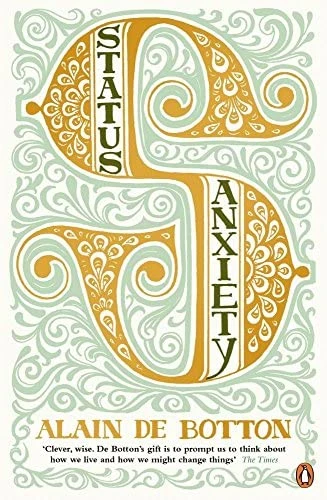
The handmaiden of contemporary ambition
A wordy look at what makes us desire success in society and what we can do to overcome the grave anxiety that our pursuit of this success injects into us.
We live in a meritocracy with strings attached. We live in a meritocracy where the judgement comes from ameboid social expectations rather than a proper set of rules, where reward is unpredictable but anxiety is guaranteed. We live in a society built atop outward perceptions and driven by an individual’s desire to be highly successful; the desire to achieve, in other words, a high status as measured on the terms of an often fickle society. We live in a society that induces in us what Alain de Botton calls Status anxiety.
The problem
“We each appear to hold within ourselves a range of divergent views as to our native qualities,” says the author. “And amid such uncertainty, we typically turn to the wider world to settle the question of our significance … we seem beholden to affections of others to endure ourselves.” This quote is a great representation of what this book is like and what it deals with. In effortlessly crisp prose Mr De Botton explains why in modern society people experience a constant fear of being perceived as less successful than someone else, or even simply unsuccessful, by the standards of a materialistic society. He attributes this to five elements: a lack of self love, snobbery, having expectations, the meritocracy referred to earlier, and the presence of dependence.
Mr De Botton first argues that the more we love ourselves the less we look outside us for approval. Next he points out that the presence of snobs in our society means we especially do not wish to be looked down upon by them. In this he makes a particularly interesting argument that luxury as we know it today is simply an attempt at adding material to ourselves to signal how much of loveable equals we are to others.
There are some we take to be our equals. There are some statuses that we believe we are capable of achieving. The former helps us define the latter. We live in a society that has, for good or bad, designed itself to maintain a chasm between the two statuses in our lives—that which we are and that which we think we ought to be—thereby introducing an anxiety built entirely around ‘status’.
It does not help then that our society believes people of higher status are better people—a meritocracy. And in such a world the poor somehow deserve their poverty and the worse-off deserve their status. They are also both worse than the rich and the successful. Being rooted in merits means no external factors matter.
The solution
For all these problems, suggests the author, exist five panaceas: philosophy, politics, art, Bohemia and Christianity.
It is in the last one that my opinions differ wildly from this book but I’m willing to extend it a loose thread and understand the spirit rather than the specific religion in question.
Philosophy introduces to us rationality, says Mr De Botton, and helps us examine others’ opinions for what they truly are. Art is what re-centres our morality, he argues next, showing us facets of life without us having to live them all. This is an argument I particularly favour, and one that I have often used to explain to people why reading fiction is important. In this book the idea stretches to all forms of art, of course, from plays to poetry to painting. In art we recognise ourselves in a most subliminal fashion. We also examine ourselves and can ponder over our deepest virtues and vices.
It also helps, says the author, to constantly keep in touch with and re-examine our priorities. It is a failure to do this that clouds our judgement of what truly matters and therefore draws us towards that which society dictates: the accumulation of material wealth as a direct — and troublingly, a reliable — indicator of one’s virtue.
A Bohemian lifestyle, says Mr De Botton, is the final piece of the puzzle. The artistic unconventionality of a Bohemian life naturally takes one away from socially-defined statuses and instead forces one to strive towards being able to hold rich conversation, make and/or appreciate art, and see life for its myriad goodness apart from materialism.
For someone who already believes in its ideas, Status anxiety is simply an example of beautiful prose. For someone struggling with status anxiety, though, this book might just be the elusive panacea.